Water drives job creation and economic growth in Asia-Pacific, says UN on World Water Day
Dushanbe, 25.03.2016. (NIAT “Khovar”). — The United Nations has urged the governments of Asia and the Pacific to address the critical gaps in access to water and sanitation, by increasing water efficiency for more balanced and sustainable growth and development, at the regional observance of World Water Day 2016, in Bangkok today.
Launched at the joint event by the United Nations Economic and Social Commission for Asia and the Pacific (ESCAP), UNESCO and ILO, the World Water Development Report 2016 (WWDR) on the theme ‘Water and Jobs’ focuses on the relationship between decent work and water, both in terms of how greater access to clean and affordable water can support health, livelihoods and the economy, and also how meeting water needs can create employment.
The United Nations Under-Secretary-General and Executive Secretary of ESCAP, Dr. Shamshad Akhtar, highlighted that more than 1.7 billion people in Asia and the Pacific still live without access to improved sanitation, which costs economies in the region the equivalent of between 0.5 per cent and 7.2 per cent of their annual GDPs.
“Water and sanitation gaps are extremely costly and inequities are sharpened as the poor pay more and the rich pay less for water,” explained Dr. Akhtar. “In some Asia-Pacific cities, the costs of one cubic metre of water from a vendor can be as much as 100 times the cost through an installed household connection. The relationship between decent work and water is especially relevant for ESCAP member States because our region generates one third of the world’s GDP. Our shared prosperity and future growth depends very directly on water availability and equitable access.”
Dr. Ramasamy Jayakumar, Chief, Natural Sciences, UNESCO Bangkok underlined that, “The 2016 edition of the WWDR demonstrates how opportunities for employment growth and decent jobs are contingent upon the sustainable management of water resources and the provision of water-related services.”
Mr. Maurizio Bussi, ILO Director, Decent Work Technical Support Team for East and South-East Asia and the Pacific said, “The Asia-Pacific region is home to 60 per cent of the world’s population meaning there are hundreds of millions of people whose livelihoods depend upon water. But too often this work is informal, dangerous and lacks the protection of basic labour rights. Yet, there are tremendous opportunities for work with water to not only contribute to greener economies and sustainable development, but to be linked decent work, jobs that offers dignity, equality, safety and a fair income.”
The observance, held at the United Nations Conference Centre in Bangkok, featured an interactive dialogue that reflected on generating sustainable employment and green growth in the Asia-Pacific region, along with of formulating water policies through participatory processes, and how to ensure economic development proceeds in an inclusive manner with attention to human development.
International World Water Day has been held annually since 1993 as a means of focusing global attention on the importance of freshwater and advocating sustainable management of freshwater resources.











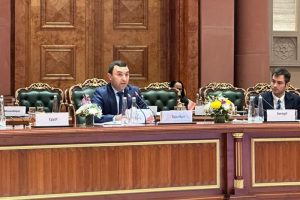 Tajikistan Promotes Digital Transformation Agenda at AI Impact Summit
Tajikistan Promotes Digital Transformation Agenda at AI Impact Summit Tajikistan Expands AI Cooperation with Google DeepMind
Tajikistan Expands AI Cooperation with Google DeepMind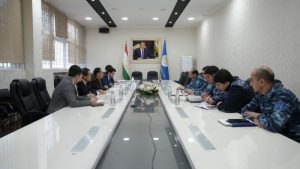 Tajik Customs, Japanese Firm Sign Deal on Cargo Scanning Upgrade Project
Tajik Customs, Japanese Firm Sign Deal on Cargo Scanning Upgrade Project Tajikistan, Iran Discuss Boosting Direct Investment Cooperation
Tajikistan, Iran Discuss Boosting Direct Investment Cooperation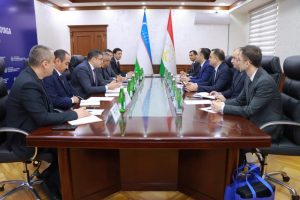 Tajik and Uzbek Anti-Corruption Agencies Discuss Expanding Cooperation
Tajik and Uzbek Anti-Corruption Agencies Discuss Expanding Cooperation Starlink Satellite Internet Launches in Tajikistan
Starlink Satellite Internet Launches in Tajikistan Austrian Company Andritz Hydro Seeks to Expand Cooperation with Tajikistan
Austrian Company Andritz Hydro Seeks to Expand Cooperation with Tajikistan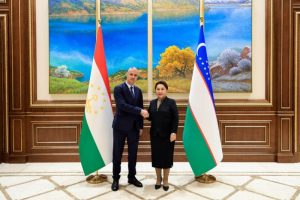 Ambassador of Tajikistan Meets with Chairperson of the Senate of Uzbekistan
Ambassador of Tajikistan Meets with Chairperson of the Senate of Uzbekistan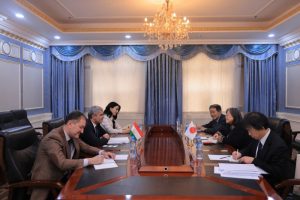 Tajikistan and Japan Discuss Cooperation within Regional and International Organizations
Tajikistan and Japan Discuss Cooperation within Regional and International Organizations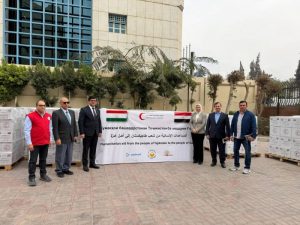 Tajikistan’s Humanitarian Aid to the People of Gaza
Tajikistan’s Humanitarian Aid to the People of Gaza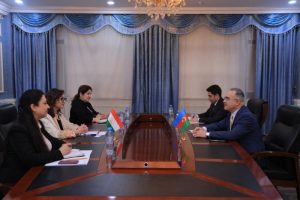 Bilateral Cooperation Between Tajikistan and Azerbaijan Discussed in Dushanbe
Bilateral Cooperation Between Tajikistan and Azerbaijan Discussed in Dushanbe Tajikistan Establishes Data Protection Center to Strengthen Cybersecurity
Tajikistan Establishes Data Protection Center to Strengthen Cybersecurity














